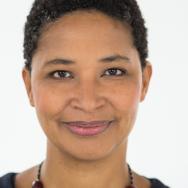Editor’s note: To read more about how UChicago is on the frontlines of the coronavirus pandemic, visit the Confronting COVID-19 website.
The deep dive into the Catalonian independence movement was out.
Upended by the COVID-19 crisis, the University of Chicago Harris School of Public Policy had scratched its spring quarter Study Abroad Program—including the course in Barcelona with Prof. Christopher Berry and Assoc. Prof. Anthony Fowler. And besides, Berry said, exploring the topic of Catalonian independence from Chicago “would probably ring hollow for students.”
So days before the quarter started, Fowler and Berry shelved their course prep work and rolled the dice. The world’s No. 1 problem was COVID-19: Could they pivot from examining policy in Spain for three weeks with undergraduates to leading a quarter-long, guided research project on the coronavirus pandemic? And, with classrooms shuttered by stay-at-home orders, could they deliver a compelling educational experience via Zoom for students from varied degree programs?
The answers, so far, have been a resounding yes.
Political scientists with expertise in data analysis, Berry and Fowler were initially worried about their ability to fill the class. Students, they guessed, would likely already have finalized their spring schedules. Instead, the email announcing the Government Responses to COVID-19 course got 60 to 70 responses in a single day.
“If you’re a person who wants to make a difference,” Berry said, “obviously you’re going to want to see if you can make a difference on the most important problem of the day.”
‘A fun opportunity to do something different’
Divided into data-collection teams, the 11 students in the class meet with the Harris scholars for one hour twice a week via Zoom and communicate via Slack. One team, Fowler said, collects data on government responses to the pandemic. Another gathers information on COVID-19 cases. A third looks at other outcomes of interest including unemployment and mobility. And a fourth digs into political factors linked to COVID-19. The teams will eventually merge their datasets.
Students bring complementary skill sets to the course—from writing code to parlaying past political campaign experience into state election data access.
For Harris graduate student Camilo Arias, who is tasked with collecting coronavirus case data for his team, the course has felt “like a part-time job.”
Usually, Berry said, “we try to teach about things after the fact, in a sense—after the data are in, after we can reach some conclusions.” But in the case of COVID-19, data change daily.
“This is a fun opportunity to do something different,” Fowler added. “Instead of just taking a class where you read about the established research on a particular topic, you actually get to participate in real time in the generation of that research with your peers and with your professors.”
With the course’s final research outputs still to be determined, two main areas of inquiry have been identified: understanding the political factors that influence government responses to COVID-19, and determining the effects of those responses.
Fowler and Berry aim to produce one or two papers by the end of the quarter and then continue the research, with students invited to remain on the project. Any additional work after the course concludes won’t lead to course credit, but could boost resumes and portfolios.
Challenges of real-time research
The class has produced some preliminary results. Unsurprisingly, Fowler said, recent in-person primary election voting appears to have increased the rate of COVID-19 transmission.
Students also have found evidence that contradicts an ongoing COVID-19 narrative: that Democratic governors have only responded to COVID-19 more aggressively because the virus is worse in their states. “What we’ve been able to show is that’s just not true,” Berry said. Instead, data show that even when there is the same level of disease prevalence in a state, a Democratic governor responds more aggressively than a Republican governor.
Research in real time brings challenges, Berry said. But one positive surprise, he noted, has been how swiftly “the global community of data people have come together to share data,” whether it be global COVID-19 cases or data that tracks people’s movement.
Because people are moving so quickly to provide data, Berry said, quality “has been something we need to be attentive to.” Students are learning, he added, that “you can’t just start by downloading the dataset and running regressions.”
Fowler also worries that the desire to get a newsworthy result can lead to bad science. But “messy” data mean students will “see how the sausage is made,” he said, “and get a deeper appreciation for how hard it is to make progress on these kinds of questions.”
Students also are learning how to navigate remote learning. “A thing that has surprised me pleasantly,” Berry said, “is that I don’t feel learning remotely has been a barrier at all. … Our interactions have been comparable to what we would get in person.”
Arias said he’s pleased how the message is getting through—and that a class he’s been a part of is having an impact.
“All this understanding will make us better prepared for future scenarios where we need to respond to something like this.”
— This story was first published on the Harris Public Policy website.

